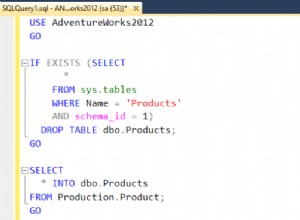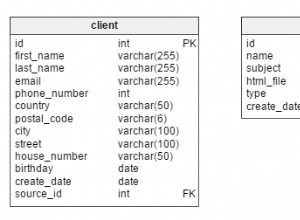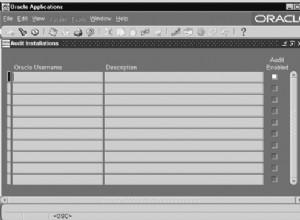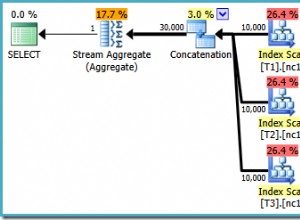J'ai obtenu un résultat intéressant dans mon mini-benchmark et j'ai décidé de le partager.
Le code d'essai :
import org.springframework.jdbc.support.JdbcUtils;
import org.springframework.util.Assert;
import org.springframework.util.StopWatch;
import java.sql.*;
public class TriggerPerformanceTest {
private static final int STEPS_COUNT = 1000;
public static void main(String[] args) throws SQLException {
final Connection connection = DriverManager.getConnection("jdbc:oracle:thin:@host:1521/oradev", "user", "pass");
prepare(connection);
final StopWatch stopWatch = new StopWatch("mini-bench");
testTrigger(connection, stopWatch);
testSequence(connection, stopWatch);
testSeparateCalls(connection, stopWatch);
JdbcUtils.closeConnection(connection);
System.out.println(stopWatch.prettyPrint());
}
private static void testTrigger(Connection connection, StopWatch stopWatch) throws SQLException {
final PreparedStatement preparedStatement = connection.prepareStatement("INSERT INTO test_table_trigger (text) VALUES (?)", new String[]{"ID"});
stopWatch.start("with trigger");
for (int i = 0; i < STEPS_COUNT; i++) {
preparedStatement.setString(1, "test");
preparedStatement.executeUpdate();
final ResultSet resultSet = preparedStatement.getGeneratedKeys();
final boolean next = resultSet.next();
Assert.state(next, "Expected not empty result set with generated keys");
final long id = resultSet.getLong(1);
Assert.state(id > 0, "Expected generated key value");
JdbcUtils.closeResultSet(resultSet);
}
stopWatch.stop();
JdbcUtils.closeStatement(preparedStatement);
}
private static void testSequence(Connection connection, StopWatch stopWatch) throws SQLException {
final PreparedStatement preparedStatement = connection.prepareStatement("INSERT INTO test_table_sequence (id, text) VALUES (sq_test2.NEXTVAL, ?)", new String[]{"ID"});
stopWatch.start("without trigger");
for (int i = 0; i < STEPS_COUNT; i++) {
preparedStatement.setString(1, "test");
preparedStatement.executeUpdate();
final ResultSet resultSet = preparedStatement.getGeneratedKeys();
final boolean next = resultSet.next();
Assert.state(next, "Expected not empty result set with generated keys");
final long id = resultSet.getLong(1);
Assert.state(id > 0, "Expected generated key value");
JdbcUtils.closeResultSet(resultSet);
}
stopWatch.stop();
JdbcUtils.closeStatement(preparedStatement);
}
private static void testSeparateCalls(Connection connection, StopWatch stopWatch) throws SQLException {
final PreparedStatement preparedStatementSeq = connection.prepareStatement("SELECT sq_test3.NEXTVAL FROM dual");
final PreparedStatement preparedStatement = connection.prepareStatement("INSERT INTO test_table_generated (id, text) VALUES (?, ?)");
stopWatch.start("separate calls");
for (int i = 0; i < STEPS_COUNT; i++) {
final ResultSet resultSet = preparedStatementSeq.executeQuery();
resultSet.next();
final long id = resultSet.getLong(1);
JdbcUtils.closeResultSet(resultSet);
preparedStatement.setLong(1, id);
preparedStatement.setString(2, "test");
preparedStatement.executeUpdate();
}
stopWatch.stop();
JdbcUtils.closeStatement(preparedStatementSeq);
JdbcUtils.closeStatement(preparedStatement);
}
private static void prepare(Connection connection) throws SQLException {
Statement statement = connection.createStatement();
try {
statement.execute("DROP TABLE test_table_sequence");
statement.execute("DROP TABLE test_table_trigger");
statement.execute("DROP TABLE test_table_generated");
statement.execute("DROP SEQUENCE sq_test1");
statement.execute("DROP SEQUENCE sq_test2");
statement.execute("DROP SEQUENCE sq_test3");
} catch (SQLException sqle) {
//ignore
}
try {
statement.execute("CREATE TABLE test_table_sequence (id NUMBER, text VARCHAR2(10))");
statement.execute("CREATE TABLE test_table_trigger (id NUMBER, text VARCHAR2(10))");
statement.execute("CREATE TABLE test_table_generated (id NUMBER, text VARCHAR2(10))");
statement.execute("CREATE SEQUENCE sq_test1 START WITH 1 INCREMENT BY 1 CACHE 20");
statement.execute("CREATE SEQUENCE sq_test2 START WITH 1 INCREMENT BY 1 CACHE 20");
statement.execute("CREATE SEQUENCE sq_test3 START WITH 1 INCREMENT BY 1 CACHE 20");
statement.execute("CREATE OR REPLACE TRIGGER trg_increment BEFORE INSERT ON test_table_trigger FOR EACH ROW\n" +
"BEGIN\n" +
" SELECT sq_test1.NEXTVAL INTO :new.id FROM dual;\n" +
"END;");
} catch (SQLException sqle) {
sqle.printStackTrace();
}
try {
statement.execute("TRUNCATE TABLE test_table_sequence");
statement.execute("TRUNCATE TABLE test_table_trigger");
statement.execute("TRUNCATE TABLE test_table_generated");
} catch (SQLException sqle) {
sqle.printStackTrace();
}
}
}
La sortie :
StopWatch 'mini-bench': running time (millis) = 27430
-----------------------------------------
ms % Task name
-----------------------------------------
09214 034% with trigger
08916 033% without trigger
09300 034% separate calls
La conclusion :la différence assez minime... à prendre en considération.
PS. Dédié Oracle 11.2.0.4, LAN 1Gb/s, Java 1.7.0_65.




